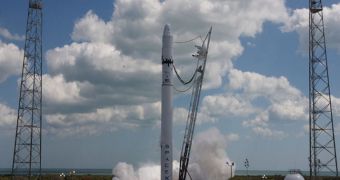Officials at the Hawthorne, California-based Space Exploration Technologies (SpaceX) announce that they have set a launch date for their new medium-lift rocket, Falcon 9. The delivery system is now scheduled to take off on May 28, from a launch facility at the Cape Canaveral Air Force Station (CCAFS), in Florida. The goal of the test is clear. If the rocket works properly, then SpaceX is on track to making good on its end of the $1.9 billion contract it signed with NASA, for carrying out 12 resupply missions to the International Space Station (ISS), Space reports.
Initially, SpaceX representatives wanted to launch the spacecraft on May 23, but some official approvals were still missing. The most important one regards the rocket's self-destruct system. This is a fail-safe mechanism that would destroy the entire delivery system, in the event of something going awfully wrong immediately after launch. This could prevent, for example, areas surrounding the CCAFS from suffering damages from debris and other hazardous materials.
Even though Falcon 9 and its Dragon capsule are currently used as unmanned vehicles, experts at the company say that the two were designed to be able to carry astronauts to orbit from the get-go. What this means is that a number of modifications can easily convert the launch system from a cargo-delivery one to a manned mission. This could prove to be extremely useful in the near future, when the NASA shuttle fleet retires. The United States would have no means of sending people to orbit, and would therefore have to relay on private companies for the job. SpaceX and Virginia-based Orbital Sciences Corporation (OSC) have thus far proven to be the best candidates for the job.
“We've been thinking about crew from the very beginning. I think we're getting really close,” explains former NASA astronaut Ken Bowersox, who is currently the SpaceX vice president of astronaut safety and mission assurance. Speaking about the delays caused by the missing final approval, he explained, “that's typically one of the last things that gets worked out on a new vehicle.” If the new tests are successful, then this would represent the addition of a new vehicle to the SpaceX arsenal. The company already operates the smaller Falcon 1 delivery system, which it launches from a spaceport on Kwajalein Atoll, on satellite-delivery missions.

 14 DAY TRIAL //
14 DAY TRIAL //